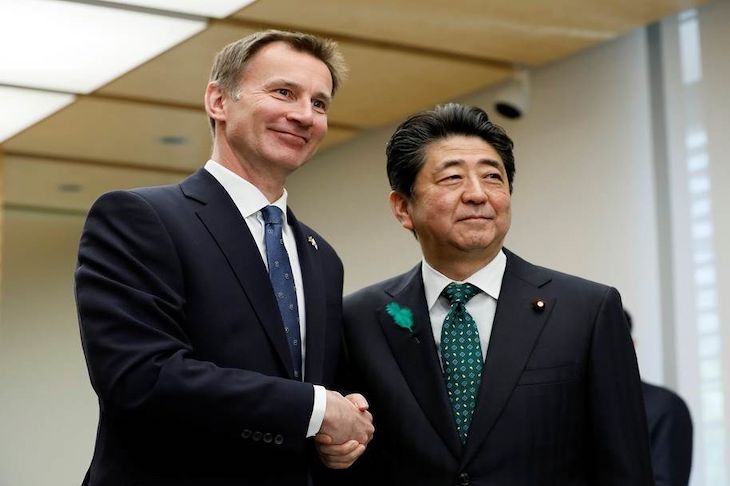Attempting to explain Brexit in 90 seconds might remind you of a Monty Python sketch, but this is what Jeremy Hunt attempted in front of a class of Japanese high school students on Monday. The foreign secretary gave a carefully worded summary of the Brexit situation using the graded language of the English language teacher he used to be. It’s not clear whether the students were any the wiser after he spoke, but the real aim of the lesson was achieved: to generate positive headlines for the Foreign Secretary on his latest visit to Japan.
Hunt has some advantages. He lived in Japan in his early 20s, mastered the language and developed an enduring affection for the country, even once making the Freudian slip of referring to his wife as Japanese (she’s Chinese). Before politics beckoned, he made several attempts to exploit his experience with various business projects that included a scheme to import British marmalade here.
As Foreign Secretary he has mainly succeeding in retaining close relations with Japan. This is his second trip to Tokyo in eight months. Theresa May was here for a flying visit in 2017, and in return Japanese PM Shinzo Abe has made two recent visits to the UK, meeting Theresa May a total of seven times in three years. Behind the scenes meetings have reportedly been intense.
Hunt’s latest mission seems to be to offer further ‘reassurances’ that the consequences of Brexit will not be catastrophic. The government doesn’t want ‘no deal’ Hunt was quoted as saying, without explicitly ruling out the possibility. It is unclear how reassured Shinzo Abe was.
The Japanese premier went on record with his concerns about Brexit early on. Even before the referendum he was warning David Cameron that a Leave vote would make the UK a less attractive destination for investment – a typically indirect coded warning. Though Abe’s concerns about Brexit are primarily financial – Japan is the one of the largest investors in the UK – and the Japanese see the UK as a convenient foothold in Europe, providing access to the single market, there may be more to it than that. Abe’s stance is in keeping with the Japanese establishment’s long held and deeply rooted support for the EU.
This affinity has interesting historical origins, and is partly down to the work of one man, the half-Japanese diplomat and philosopher Richard von Coudenhove-Kalergi, who was a pioneer of European integration and founding president of the Paneuropean Union. Kalergi, a romantic figure believed to have been the model for the Victor Laszlo character in Casablanca, was responsible for many of the symbols and artefacts of the EU. He chose its anthem (Ode to Joy) and put forward a design for the EU flag, which bears a striking similarity to that of Japan’s.
The well-connected Kalergi made numerous visits to Japan and became acquainted with the head of NHK Japan’s public service broadcaster, the influential modern politico-religious organisation Soka Gakkai, and even Emperor Hirohito. With his books and articles and assiduous networking he helped embed a positive impression of the EU in the Brahmin class of Japanese society, to which Abe most certainly belongs, an impression which still persists to this day.
However, despite Kalergi’s undoubted influence, it is worth pausing before assuming that Japan in its entirety is opposed to Brexit. My impression, as a resident of 20 years, is that people outside the elite, and not employed by a corporate behemoth, have an open-minded curiosity and a genuine desire to know more.
I got a glimpse of this when I taught a series of ‘Brexit explained’ lectures to three sets of students at Sophia University in Tokyo in 2017. With rather more time afforded to me than Jeremy Hunt, I was able to able to present the basic facts, and most common arguments. I was scrupulous in not influencing the students in either direction, refusing to answer questions about my own views. They seemed riveted, and when I offered them the chance to vote Leave or Remain at the end of class, they voted, to my surprise, by a small but clear margin, to leave. Perhaps Abe should take note.






Comments